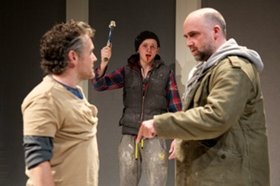It is a delight to welcome Shoot the Crow to Belfast in its first production in McCafferty’s home town fourteen years after its first production by Druid and with plaudits from an extended West End run, including a nomination for an Olivier Award. While such success demonstrates that the play is far from parochial in its scope and interest, it is nonetheless rooted in the demotic speech of Belfast, re-shaped, heightened and made serviceable as a discourse through which the degrading grind of repetitive work is both resisted and expressed.
Four men spend a day tiling two adjacent rooms in a new apartment development. This is not a celebration of the dignity of work, but a demonstration of the demeaning effect of being tied to a low-paid job from which escape is impossible. For Ciaran McIntyre’s Ding Ding, this is the last day of many years working as a tiler, with little to show for his effort but a handwritten thank-you note from the boss. He tries to encourage Randolph (Rhys Dunlop), a young apprentice, to pursue his dream of freedom on a motorbike on the roads of France. His own dream is to buy a window-cleaning round, so that he can carry on working once he retires. Meanwhile Petesy (Fergal McElherron), who is nominally in charge, is scheming to find a way to pay for his daughter to take part in a school exchange to France, so she won’t end up in the same dead-end kind of work as him. Socrates (Stephen Kennedy) can barely face the pain of existence without the wife and son he has left and is desperate for a reconciliation.
For each of them, then, the stakes are high when it becomes apparent that there is a palette of tiles which they can steal and sell undetected, providing enough money to fulfil what are, after all, very modest ambitions. This simple premise then sets the play’s dynamic in motion ultimately exposing the fault lines of their relationships when they realise that they are competitors rather than partners in crime.
Ciaran Bagnall’s L-shaped set is composed of two white platforms at different levels, representing the separate rooms. They are covered with the large expensive white tiles which the men are grouting to finish this job. Behind them are two white wood frames with opaque grey inset panels onto which the cityscape of Belfast’s bustling ring-road is projected to indicate time’s passing. The actors step down from the platforms and sit in full view at the side for exits to other parts of the fictional apartment and the world beyond. Apart from the tools of the tilers’ trade, this is, then, an empty space filled by the characters’ aspirations, competitive schemes and ultimate disappointments, expressed routinely in how they speak. McCafferty shows how words reveal and shield truths, communicate and conceal hurts, create and break bonds.
 Each of the four characters has a distinctive voice (with matching accent) and the casting here provides a corresponding physical typology. The play’s opening scene suffers a little in the mismatch between McIntyre’s Ding Ding, looking like a bedraggled and embittered Santa, and the barely grown frame of Randolph. Too much of the scene is played as mere speaking and Emma Jordan’s direction looked insecure. By contrast, McElharron’s diminutive Petesy is a ball of intense anger who is a perfect foil to the wounded-bear of Kennedy’s Socrates. From their appearance, the play starts to zing as words start to do things and Jordan’s direction supports effectively the actors as they deliver speech as action.
Each of the four characters has a distinctive voice (with matching accent) and the casting here provides a corresponding physical typology. The play’s opening scene suffers a little in the mismatch between McIntyre’s Ding Ding, looking like a bedraggled and embittered Santa, and the barely grown frame of Randolph. Too much of the scene is played as mere speaking and Emma Jordan’s direction looked insecure. By contrast, McElharron’s diminutive Petesy is a ball of intense anger who is a perfect foil to the wounded-bear of Kennedy’s Socrates. From their appearance, the play starts to zing as words start to do things and Jordan’s direction supports effectively the actors as they deliver speech as action.
Kennedy has perhaps the most difficult task in the role of Socrates. He is both the intellectual of the group and the one most in touch with his own feelings. He chooses to say things that the other men avoid (by switching to talk about football). He has a number of set-piece moments where his words spill out in streams of consciousness, switching topics, contradicting himself, or demonstrating just how bewildered he is at the way his life has turned out. However, unlike the others, he is eventually shown to be a man of action, not just words. Crucially, Kennedy demonstrates the capacity not just to achieve all this, but to nuance sensitively his reactions as he listens to each of the others.
McCafferty’s skill is in capturing the unremitting angst at the heart of this everyday activity. With Kennedy at its heart, this ensemble is able to honour this skill, playing the everyday but expressing the existential.
Tom Maguire is a Senior Lecturer in Theatre Studies at the University of Ulster.